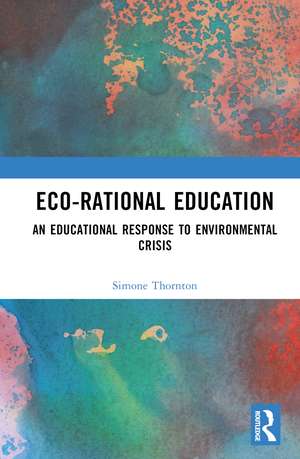Eco-Rational Education: An Educational Response to Environmental Crisis
Autor Simone Thorntonen Limba Engleză Hardback – 28 iul 2023
The book argues that education is a powerful vehicle for both social change and cultural reproduction. It proposes that the prioritisation and integration of environmental education across the curriculum is essential to the development of ecologically rational citizens capable of responding to the environmental crisis and an increasingly changing world. Using philosophical analysis, particularly environmental philosophy, pragmatism, and ecofeminism, the book develops an understanding of contemporary issues in education, especially inquiry-based learning as pedagogy, diversifying knowledge, environmental and epistemic justice, climate change education, and citizenship education.
Eco-Rational Education will be of interest to researchers and post-graduate students of social and political philosophy, educational philosophy, as well as environmental philosophy, ethics, and teacher education.
| Toate formatele și edițiile | Preț | Express |
|---|---|---|
| Paperback (1) | 302.89 lei 3-5 săpt. | +19.09 lei 10-14 zile |
| Taylor & Francis – 29 noi 2024 | 302.89 lei 3-5 săpt. | +19.09 lei 10-14 zile |
| Hardback (1) | 934.94 lei 3-5 săpt. | +20.62 lei 10-14 zile |
| Taylor & Francis – 28 iul 2023 | 934.94 lei 3-5 săpt. | +20.62 lei 10-14 zile |
Preț: 934.94 lei
Preț vechi: 1027.40 lei
-9% Nou
Puncte Express: 1402
Preț estimativ în valută:
178.90€ • 187.29$ • 148.03£
178.90€ • 187.29$ • 148.03£
Carte disponibilă
Livrare economică 15-29 martie
Livrare express 04-08 martie pentru 30.61 lei
Preluare comenzi: 021 569.72.76
Specificații
ISBN-13: 9780367700782
ISBN-10: 0367700786
Pagini: 192
Dimensiuni: 156 x 234 x 17 mm
Greutate: 0.45 kg
Ediția:1
Editura: Taylor & Francis
Colecția Routledge
Locul publicării:Oxford, United Kingdom
ISBN-10: 0367700786
Pagini: 192
Dimensiuni: 156 x 234 x 17 mm
Greutate: 0.45 kg
Ediția:1
Editura: Taylor & Francis
Colecția Routledge
Locul publicării:Oxford, United Kingdom
Public țintă
Academic, Postgraduate, and ProfessionalRecenzii
‘At the core of Simone Thornton’s concerns is the development of eco-rational thinking as central to environmental education aimed at purposeful engagement in identity formation towards ecological citizenship. Eco-Rational Education: An Educational Response to Environmental Crisis innovatively addresses complex concepts and pressing issues and provides a compelling argument for dialogic education that engages students with Indigenous and non-indigenous socio-political concepts to open conversation on diverse ways of knowing and being in the world. Eloquently written, Thornton offers a pedagogical framework that challenges educators to reposition environmental education as a cross-curriculum learning priority for synthesising curriculum with place-responsive practice and, as such, has published a very timely book that makes a significant contribution to re-visioning education as the socio-cultural reconstruction of the greater community.’
Gilbert Burgh, Honorary Associate Professor in Philosophy, School of Historical and Philosophical Inquiry, The University of Queensland, Australia.
‘Thornton’s ground-breaking Eco-Rational Education: An Educational Response to Environmental Crisis provides a compelling account of why we must upend some deep-seated philosophical and educational assumptions in order to implement effective environmental education in schools. By skilfully interconnecting the ideas of a surprisingly diverse range of scholars, including Albert Camus, Val Plumwood, Mary Graham, Gayatri Chakravorty Spivak, Plato, and James Baldwin, Thornton argues that educational institutions must reject the notion that a key aim of education is the development of individuals with a rational capacity that enables them to dominate nature and ‘the other’—a form of epistemic violence. Thornton’s book is not merely a critique. It also offers an innovative and practical alternative, namely a type of eco-rational education, which draws on ideas from pragmatism, Philosophy for Children, and place-based learning to provide teachers with specific methods they can use to foster transformative environmental education.’
Jennifer Bleazby, Senior Lecturer, School of Education, Society and Culture, Monash University, Australia.
Gilbert Burgh, Honorary Associate Professor in Philosophy, School of Historical and Philosophical Inquiry, The University of Queensland, Australia.
‘Thornton’s ground-breaking Eco-Rational Education: An Educational Response to Environmental Crisis provides a compelling account of why we must upend some deep-seated philosophical and educational assumptions in order to implement effective environmental education in schools. By skilfully interconnecting the ideas of a surprisingly diverse range of scholars, including Albert Camus, Val Plumwood, Mary Graham, Gayatri Chakravorty Spivak, Plato, and James Baldwin, Thornton argues that educational institutions must reject the notion that a key aim of education is the development of individuals with a rational capacity that enables them to dominate nature and ‘the other’—a form of epistemic violence. Thornton’s book is not merely a critique. It also offers an innovative and practical alternative, namely a type of eco-rational education, which draws on ideas from pragmatism, Philosophy for Children, and place-based learning to provide teachers with specific methods they can use to foster transformative environmental education.’
Jennifer Bleazby, Senior Lecturer, School of Education, Society and Culture, Monash University, Australia.
Cuprins
Introduction 1. Albert Camus: insights into moral education 2. Economic rationality and ecological failure 3. The myth of reversal: identity, history, and the colonial imagination 4. Truth, certainty, and the limits of knowledge 5. History: lessons in time and identity formation 6. Dwelling in uncertainty 7. A pedagogy of lucidity
Notă biografică
Simone Thornton Lectures in Philosophy, at the School of Humanities and Social Inquiry, University of Wollongong, and is an Honorary Research Fellow, at the School of Historical and Philosophical Inquiry, The University of Queensland. Her research intersects social and political philosophy, educational philosophy, and environmental education, with a focus on developing ecologically rational forms of education.
Descriere
Eco-Rational Education proposes an educational response to climate change, environmental degradation, and human relations to ecology through the delivery of critical land-responsive environmental education.
